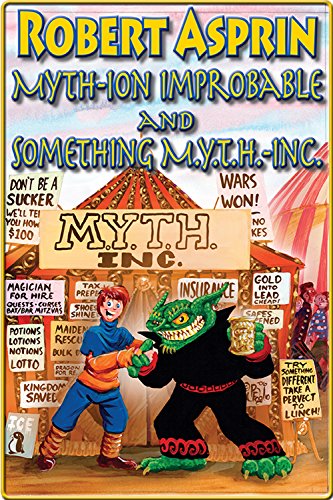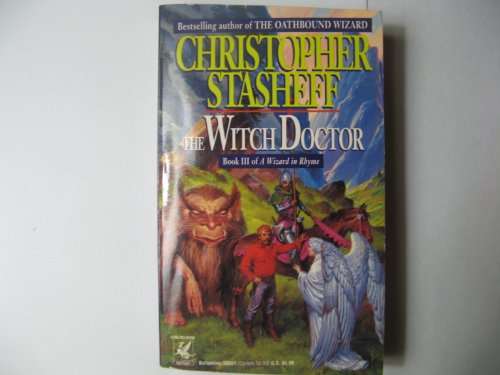
Myth-ion Improbable, by Robert Asprin – This was Asprin’s return to this series after a break of eight years due to trouble with the IRS. And I haven’t read any of the books in the series in a few years, so that fits. In order to get back into the rhythm, Asprin set this book back in the days before the founding of M.Y.T.H. Inc., when Skeeve was still living full-time in Klah. Aahz and Tananda, a trollop (female troll), follow a treasure map to the Old West styled dimension of Kowtow. It’s a place full of friendly people who all keep vegetarian diets despite the presence of many cows, which turn out to be vampires. It’s a pretty amusing concept, and a little creepy as well.
Something M.Y.T.H. Inc., by Robert Asprin – The books with “M.Y.T.H. Inc” in the title usually take the point of view of someone other than Skeeve, in this case a few different friends and co-workers of his. There’s growing discontent over Skeeve’s performance as Royal Wizard of Possiltum, and his mob bodyguards check it out without letting their boss know. Most of it is due to parodies of Robin Hood and The Lord of the Rings, the latter a group of fantasy fans who are aware of the parallels. Yes, it’s a fantasy role-playing group in a fantasy world. Since these opponents of Skeeve’s don’t do a whole lot, there’s not that much conflict, or really even a whole lot of plot. As such, while funny enough overall, it’s not one of the stronger works in the series.

The Witch Doctor, by Christopher Stasheff – While the first two books of this series were focused on Matthew Mantrell, a graduate student who was transported to a more fantastic but less morally complicated world and became a wizard, this one mostly follows his friend Saul Bremener, who finds himself in the same world and is even more reluctant than Matt was to dedicate himself to either good or evil. He seeks to defeat Suettay, the witch queen of Allustria, and manages to save several of her hench-witches, hence the title. He teams up with his guardian angel, a poet whose rhymes come true, a troll who’s enchanted not to eat people, a squire, and an attractive ghost. They also ally themselves with the Spider King, who has his own dimension that intersects the others. There’s more discussion of the nature of alternate worlds, and of course a lot of moral philosophy. Saul isn’t really as morally ambiguous as he makes himself out to be, and even the other characters notice this, so it’s probably intentional. The thing is, the way this world is written, there doesn’t seem to be any real reason NOT to choose good over evil, as they’re both clearly and unambiguously defined. I’ve written before about the God of the Bible frequently doesn’t follow His own moral code, but this series doesn’t really get into that.

Pocket Apocalypse, by Seanan McGuire – Alexander Price goes with his girlfriend Shelby Tanner to her native Australia to combat a werewolf epidemic. He also meets Shelby’s family, who hate him for no real reason, but I guess that’s just how these things sometimes work out. I guess the fact that we see everything through his point of view makes the Tanners seem totally unreasonable even though we are given their side of things. It’s probably my least favorite in the InCryptid series that I’ve read so far, but it has an interesting take on werewolves. In this world, lycanthropy is treated as a virus that can affect all mammals (so there are, for instance, werewolf sheep), and while those infected originally act mindless, they’re later able to make intelligent plans to further their goal of spreading the disease. In this Australia, bunyips and drop-bears are real, and there’s an appearance by a quite delightful yowie.

Radiance, by Catherynne M. Valente – I’ve enjoyed the other books of Valente’s I’ve read (the Fairyland series plus Space Opera and Deathless), but this one I mostly just found confusing and difficult to follow. I can appreciate Valente’s mix of genres and way of telling the story, but I found myself not being able to fully piece it all together. Maybe that’s my fault more than hers. It focuses on a film industry where talking pictures are still unusual, but every planet in the solar system has been colonized, and they’re all frequently used for filming. The narrative alternates between scripts, interview transcripts, and more typical prose, largely centered around the life and disappearance of filmmaker Percival Unck’s daughter Severin. There’s world-building (or should that be “worlds-building”?), philosophy, and humor. It’s not that I didn’t enjoy reading it, just that I don’t know that I feel much richer for the experience after finishing. Oh, well.
